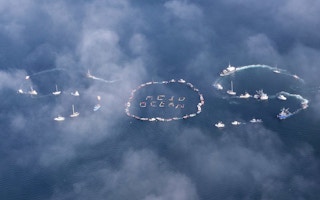The oceans are becoming a repository for almost all of Earth’s excess heat, driving up sea levels and threatening coastlines, according to a leaked draft of the most comprehensive United Nations report addressing climate science.
Temperatures in the shallowest waters rose by more than 0.1 degree Celsius (0.18 degree Fahrenheit) a decade for the 40 years through 2010, the study found. Average sea levels have increased worldwide by about 19 centimeters (7.5 inches) since 1901 and researchers said it’s “very likely” the system of ocean currents that includes the Gulf Stream will slow in the coming decades.
The findings are detailed in a 2,200-page report that will guide UN envoys as they devise a new treaty to fight climate change by 2015. It was obtained by Bloomberg from a person with official access to the report who declined to be further identified because it hasn’t been published. The UN declined to comment.
“The Earth is absorbing more heat than it is emitting back into space, and nearly all this excess heat is entering the oceans and being stored there,” the report’s authors wrote. “Changes have been observed in ocean properties of relevance to climate during the past 40 years, including temperature, salinity, sea level, carbon, pH and oxygen.”
The report, entitled “The Physical Science Basis,” is the first of three parts that will make up the UN Intergovernmental Panel on Climate Change’s fifth Assessment Report, or AR5, into climate science. The research includes a 31-page “Summary for Policymakers” that condenses the main findings of the first part into a single document that ministers may consult when devising a global policy.
‘Extremely likely’
It’s “extremely likely” mankind is responsible for more than half of the observed temperature rises since the 1950s and it’s “virtually certain” the global rate of sea-level rise has accelerated over the past two centuries, according to the summary document. Those main points are little changed from an earlier version that was leaked by the blogger Alec Rawls on the website www.stopgreensuicide.com in December.
Jonathan Lynn, a spokesman for the UN panel, or IPCC, declined to comment on the report. “It’s still a work in progress and may change in the light of comments from government and it may not yet meet the IPCC’s rigorous quality and accuracy standards,” he said.
Ice sheets
The latest version of the summary includes a lower forecast for temperature rise from 2016 through 2035 of 0.3 degrees to 0.7 degrees Celsius, compared with 0.4 degrees to 1 degree in last year’s version. Both versions conclude that there’s “very high confidence” the Greenland Ice Sheet has lost mass and “high confidence” the same has happened to the Antarctic Ice Sheet. The two ice sheets contain more than 99 percent of the planet’s freshwater ice, according to the National Snow & Ice Data Center.
The precise wording of the summary will be debated line-by-line by government envoys from around the world at an IPCC meeting that starts in Stockholm on Sept. 23. The larger report is usually only altered to amend factual errors and copy edits.
The report predicted that a slowdown in the strength of the Atlantic Meridional Overturning Circulation “in the next decades is very likely.” That’s the system of currents that includes the Gulf Stream and helps keep Europe warmer than other parts of the world at the same latitude. The chapter on oceans, third in the 14-chapter report, found “no evidence of a long-term trend” in currents.
More acidic
Oceans are becoming more acidic, with the pH level dropping by about 0.1 since industrialization because the seas are absorbing human emissions of carbon dioxide, according to the report. The gas forms carbonic acid in seawater. The mean pH level of the oceans’ surfaces ranges from about 7.8 to 8.4.
While the researchers said the ocean remains basic rather than acidic, meaning it has a pH level greater than 7, falling pH is a measure of acidification that may harm marine life from mollusks to fish, according to an Aug. 25 study in the journal Nature Climate Change.
“If we don’t act there will be bad things happening down the line — from sea level rise to acidification and warming,” Hans-Otto Poertner, an author of that study and a biologist at the Alfred Wegener Institute in Bremerhaven, Germany, said in a phone interview. Poertner’s findings will be used in the second part of the UN assessment report, due in March.
Sea levels are likely to rise by 26 centimeters to 81 centimeters between the 20 years ending in 2005 and the last two decades of this century, the researchers said in the report.
‘Final draft’
The 104-page oceans chapter is labeled “final draft” and dated June 7, 2013, at the top of every page, with Aug. 12, 2013, on the cover sheet. It includes placeholders for diagrams and charts.
More than 830 authors and editors from 85 countries are compiling the full, three-part report. The summary of the first part is due to be formally released on Sept. 27. Summaries of the other two parts are due for publication in March and April, and a final synthesis slated for publication in October 2014 will draw them all together.
The language in the report assigns numerical probabilities. “Virtually certain” means there’s a 99 percent to 100 percent likelihood; “extremely likely” means at least 95 percent; “very likely” is greater than 90 percent and “likely” is at least 66 percent.
In the fourth report in 2007, the IPCC said global warming is an unequivocal fact and that “most of the observed increases in globally-averaged temperatures since the mid-20th century is very likely due to the observed increase in anthropogenic greenhouse gas concentrations.” Previous assessment reports were published in 1990, 1995 and 2001.

















